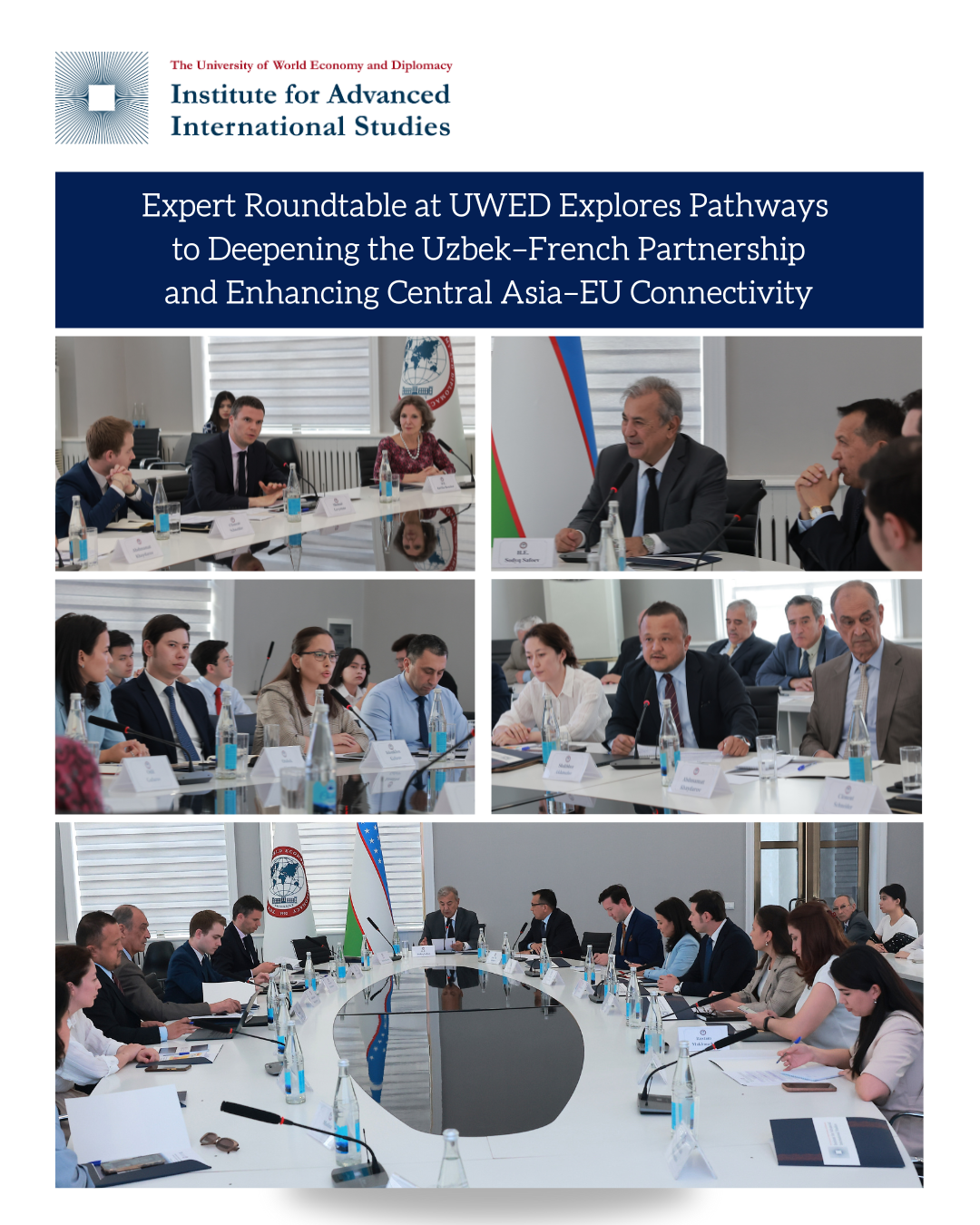
In a landmark initiative aimed at fostering academic dialogue and strengthening international partnerships, the Institute for Advanced International Studies (IAIS), with the support of the University of World Economy and Diplomacy (UWED) and the Embassy of France in Uzbekistan, convened an expert roundtable titled “Deepening the Uzbek–French Partnership and Central Asia–EU Connectivity: Security, Economic and Political Dimensions” on June 5, 2025.
The event brought together a distinguished group of participants, including faculty members, undergraduate, graduate, and doctoral students of UWED, researchers of IAIS, as well as representatives of national and international research institutions. Notably, the roundtable was attended by representatives of the French Embassy in Tashkent led by H.E. Ambassador Aurélia Bouchez. Also present were researchers and experts from the Centre de Recherche Europes-Eurasie (CREE, France), Institute for Strategic and Regional Studies, International Institute for Central Asia, Center for Foreign Policy Studies, Center for Progressive Reforms, and the Institute for Macroeconomic and Regional Studies.
Opening remarks were delivered by H.E. Sodyq Safoev, First Deputy Chairman of the Senate of the Oliy Majlis and Rector of UWED, and H.E. Ambassador Aurélia Bouchez. In their addresses, they underlined the growing strategic importance of the Uzbek–French partnership within the wider context of Central Asia’s evolving relationship with the European Union. They emphasized that amid shifting global dynamics, the advancement of security, economic integration, and political dialogue between the two regions has become a matter of shared interest and mutual benefit.
The keynote speaker, Michaël Levystone, Research Fellow at CREE (INALCO) and co-founder of the New Eurasia Observatory (ONE), presented a French expert’s perspective on Uzbekistan’s foreign policy. In his presentation, Mr Levystone provided an in-depth analysis of Uzbekistan’s diplomatic trajectory over the past decade, underscoring the country’s multivector approach and its efforts to deepen political dialogue with both Western and regional actors.
Panel discussions were moderated by Dr Durbek Amanov, Head of the Centre for European Studies at IAIS, who guided the conversation through its multifaceted agenda, exploring themes ranging from foreign policy and water diplomacy to regional security and infrastructure connectivity. The session opened with a speech by Dr Islomkhon Gafarov, IAIS, who addressed the challenges and opportunities in enhancing cooperation between Central Asia and the European Union in the realm of regional security. He highlighted the importance of forging trust-based partnerships to respond to shared concerns, including instability in neighboring Afghanistan.
This was followed by a presentation from Shakhboz Akhmedov, IAIS, who discussed the evolving EU–Central Asia partnership on transboundary water cooperation. Mr Akhmedov examined EU-funded initiatives aimed at supporting regional water management reforms and underscored the significance of sustainable resource governance for long-term regional stability and environmental security.
Concluding the panel, Nargiza Umarova, IAIS, explored the potential of Uzbekistan to play a key role in the expansion of strategic transport corridors between Central Asia and Europe. Her analysis focused on logistical diversification and infrastructure modernization projects, such as the Trans-Caspian International Transport Route, that are reshaping Eurasian connectivity and linking Uzbekistan more closely to European markets.
Throughout the event, the roundtable maintained a dynamic academic atmosphere, marked by interactive engagement from participants who posed insightful questions and contributed to the broader dialogue.
In her concluding remarks, H.E. Ambassador Aurélia Bouchez praised the quality of the dialogue and reiterated the importance of creating sustained platforms for discussion between academics, diplomats, and policy practitioners. The event concluded with a shared understanding of the need to build more resilient political and economic ties across the Eurasian continent, with Uzbekistan at the heart of these emerging dynamics.